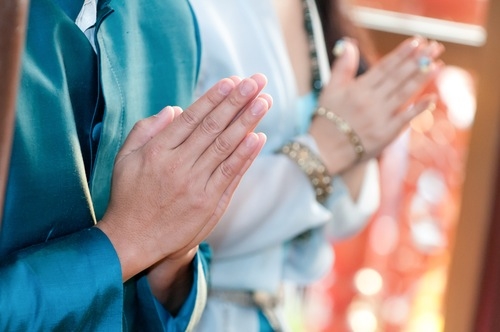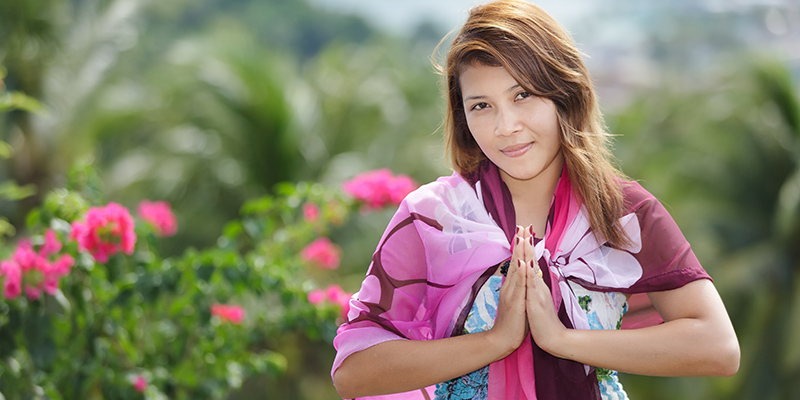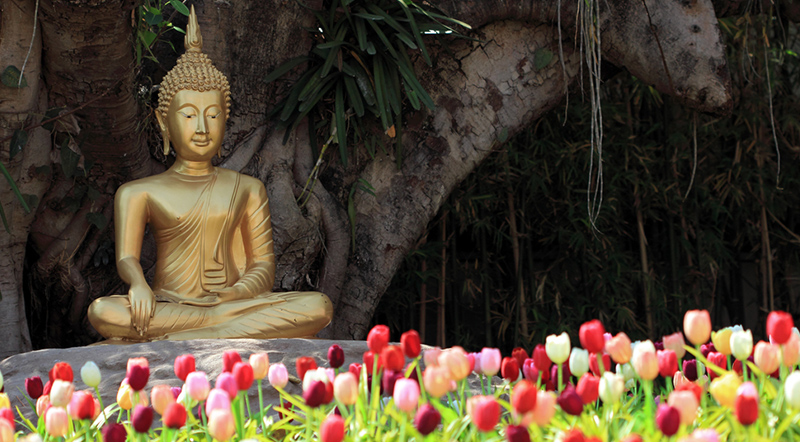Here Are Important Everyday Manners and Common Courtesy You Should Be Aware Of
1. Show Respect with your Body Language
Thailand is a “high context” culture – meaning we pay the most attention in any conversation to what is NOT said. In other words, actions speak louder than words. That’s why I’m starting this discussion about manners with body language – the unspoken part of communication that speaks the loudest to us. Westerners tend to make bigger, broader gestures with their hands, raise their voices to be understood, and allow their feelings to show on their faces. We Thais are used to keeping our body language – our gestures, voices, and facial expressions under control– so we may be a little harder for you to “read.”
2. Keep Your Hands to Yourself
In Bangkok, most Thai people have adapted to the Western handshake as a greeting. But it’s an accommodation to your ways, not natural for us. So if you stick out your hand when you’re introduced to a Thai person, don’t expect a firm, hearty, three-pump handshake in return. That’s because we Thais do not touch each other in public. We greet each other with a wai, the position of our hands and the nod of our head indicating our respect for the other person’s status and position.
And depending on the culture you come from, or your family origins, you might be comfortable touching people to show your warmth, concern, or good intentions toward them. A pat on the shoulder or a touch on the arm may be very natural for you. But in Thailand such gestures can be horribly misunderstood — no matter how kind or honest your intention. Particularly if they occur in public, and particularly if you, a man, are touching a Thai woman.
In our culture, it is considered extremely impolite for a man to touch a woman in public, and a woman is likely to be highly insulted. But because she’s trained to keep her body language under control, you might never know how insulting or rude your behavior has seemed to her.So if you’re dating a Thai woman, visiting friends, or just appreciating children playing in the park, keep your hands to yourself. Do not express your goodwill or friendliness or warmth with even an innocent touch on the back of the hand, until your relationship is firmly established and you know each other very very well.
And for sure, don’t expect a big hug hello or a kiss goodbye from someone you’ve just met!
3. “Mind Your Head!”
It is very important for you to understand that we Thais consider the head the most sacred part of the body. Never…ever…touch a Thai person’s head, regardless of their age. Not even a baby’s! This reverence for the head also applies to religious images or statues. So never… ever…touch a Buddha figure or a statue of the king or other revered person on the head. And since we’re on the subject of “minding your head,” it might be important for you to know that when you are talking with a Thai person, nodding does not mean that person agrees with you. When they nod, it’s to indicate that they are listening to you. And there you have a potential misunderstanding! If you want to make sure they agree with you or understand what you are saying, ask them gently what they think about it. DON’T ask “do you agree?” or “do you understand?” Because the Thai person will not risk losing face or causing you to lose face by admitting they don’t.
4. “Keep your Feet to Yourself!”
Just like the head is the most sacred part of the body, the feet are the lowliest and dirtiest part of the body. They are used only for walking. They get dirty working in the fields, walking on the streets, and they pick up all kinds of debris. We Thais are accustomed to removing our shoes before going indoors. And once the shoes are off, our feet are tucked away out of sight. We do not rest them on the coffee table. We do not use them to point at something. We do not use them to kick the cupboard door closed. When we sit down, we do not jiggle our foot up and down. We make sure that wherever we are, the soles of our feet are not pointing at anyone. And we do not hold our feet up to indicate we want a pedicure!
A Western guy we know invited his Thai girlfriend’s parents to his home for the first time. When he sat down on the sofa and put his feet up on the table, her parents were so horrified they fled the apartment and refused to speak to him again. It’s not an exaggeration to say that being ignorant of “foot etiquette” can cause great offence and cost you the very goodwill you want!
5. Respect Your Elders
We Thais show respect to elderly or more senior people non-verbally. First, there is a difference in the greeting – the depth of the bow and the higher placement of the hands in making the wai signifies greater respect. But so does our physical position to them when we’re in the same room together.
For example, if an elderly person (or other higher-status person) is seated, we would never stand near them with our head higher than theirs. No well-brought-up Thai person would! Instead, we would either sit at their feet or crouch so that our head is lower than theirs.
Likewise, it is not proper to talk to someone with more senior persons sitting or standing between you. That will mean you are talking over the head of the senior person, and no Thai with good manners wants to do that.
6. Show Respect with your Conversational Skills
While we Thais will certainly delight in you just being yourself, if you really want to make a good impression you might want to pay more attention to what you say and how you say it in conversations – and be a bit more sensitive to your environment than you are used to. Here are some tips:
7. Keep Your Voice Down!
By nature, Westerners talk louder than we do. It’s just part of your outgoing, exuberant nature. And some Western cultures are just naturally louder than others. Americans and Australians, for example, are louder than the British or Canadians. Not right or wrong, just different. And, comically, some Westerners seem to think that talking louder helps people understand them better.
But in Thailand, loudness is often a signal of anger or conflict – something we try our best to avoid. If you are introduced to someone for the first time, or are in a group of Thai people, be careful with the volume of your voice so people won’t misunderstand and think you are too aggressive or rude.
8. Watch Your Language!
No matter how common it may be in your language, swearing, cursing, or bad language is not common here, and is considered extremely hurtful and offensive. Whether we understand the words or not, just the sound of cursing is unmistakable to us. It sounds violent, angry, ugly and aggressive, and it makes us extremely uncomfortable. We have friends from parts of the world where swearing is considered a colourful art form. But it’s taken me a long time to get used to hearing it and not getting offended or taking it personally.
Another thing about language that’s difficult for us Thais to understand is sarcasm or irony. The key to sarcasm is creating two different messages – one with your tone of voice, and the other with your words. Left to our own devices, we Thais pay attention to the tone of your voice and the expression on your face – not to the words you are using. So the finer points of sarcasm are lost on us, and we are likely to misunderstand or take offence.
9. Don’t Argue!
In the previous article, when we talked about the differences between Thai and Western attitudes of “me” vs. “we,” and “nurturing” vs. “achievement,” I pointed out that in your culture standing up for yourself, expressing your opinion, stating your personal preference, and arguing for your point of view are natural, right, and expected. Some Westerners even seem to enjoy “arguing for sport.”
But we Thais prefer to blend in, avoid direct argument or confrontation, and generally do whatever we need to do to smooth over a situation and achieve peace, harmony, and agreement. We see raised voices, confrontational language (like “How can you say something so stupid!”) as aggressive, rude, and thoughtless.
So it’s important when you’re conversing with Thai people that you show more respect for others than you claim for yourself. I’m not asking you to “go against your grain.” You can show respect for someone else’s point of view without giving up your own. All you have to do is say something like “I see what you mean,” or “I understand that’s important to you” and you’ve avoided an argument altogether!
10. Listen More than you Speak!
In a book on Thai social etiquette published by our Ministry of Culture in 2007, the following advice is offered to be considered a person of good manners:
- A well-mannered person will not boast and sing his own praises. Nor will he say things to put down other people. He does not criticise anyone openly and does not give advice without being invited to do so.
- He does not interrupt or make noise when people are speaking.
- He avoids talking about important issues such as religion, political differences,
- etc., which can cause dispute.
- He keeps quiet when a person is making a speech, when someone at a panel discussion is speaking and when he attends a concert.
If you think about it, this advice is probably not much different than the advice you’d get by an etiquette expert in your own country! As a matter of fact, the American author Mark Twain is famous for saying, “It’s better to remain silent and be thought a fool than to speak and remove all doubt.”
11. Pay Attention to Who You’re Talking To!
A good conversationalist in any culture pays attention to the people he’s speaking with. He looks them in the eye. He lets them finish what they are saying. He does not talk shop with someone and exclude others from joining in the conversation. A thoughtful conversationalist introduces subjects that suit the people around him, considering their age, their sex, their level of understanding and education, as well as their social status. And a thoughtful conversationalist steers the conversation away from anything that could cause disharmony – like politics, religion, or highly-charged subjects. You wouldn’t talk nuclear physics in a group of farmers. You wouldn’t talk about pornography with your grandparents. And you wouldn’t argue the merits of Christianity with a Buddhist monk. In other words, the art of good conversation depends on paying attention, being thoughtful, and considering the impact of your words and behaviour on the people around you. In the last chapter, I shared with you our custom of referring to people with the prefix “khun” to show respect. If you are speaking to anyone, male or female, that you don’t know well, use “khun” before their given name in conversations.
12. Dress for Success
While the climate in Thailand is always hot, humid, and sultry, we Thais tend to dress more conservatively than you do in the West, especially in Bangkok. While you may be very comfortable in shorts and a t-shirt when you visit, you won’t see many Thais dressed that way!It relates to the whole “high context” dimension of our culture. The way you are dressed communicates volumes to us – not only your social status and prosperity, but also your level of respect for the place or person you are visiting. So it’s important to dress for success.That means clean, tidy, well-fitting clothing. No baggy pants that hang below your backside. No shabby t-shirts. And because you’ll be taking off you shoes often when you visit homes, temples, and tourist attractions, make sure there are no holes in your socks, too!
Any conservative Western “smart casual” clothing will work here – with a standard business suit and tie for formal business occasions. Luckily, clothing made in Thailand is particularly beautiful and comfortable to wear.You will see people of higher social position, especially the ladies, wearing traditional clothing made in the upcountry regions. And both Thai women and Thai men wear clothing made of the famous Thai silk, which is very comfortable and breathable in our hot climate.
On the beaches you will not see skimpy bikinis or “Speedo” type swimsuits. Our modesty and conservatism dictates that we are appropriately covered. Many times you’ll see Thai people swimming in shorts and t-shirts – even the women. And if you visit the countryside, rural people who bathe in the rivers are even dressed while bathing! If you have any doubts about what to wear when, you won’t go wrong by being too conservative. You can take comfort in the fact that most restaurants, shops, and businesses in Bangkok are air conditioned.
13. Be a Good Guest
We say in Thailand “Whoever comes to our house will be welcome.” This clearly expresses our spirit of hospitality. Visitors to Thailand are always impressed by our warmth, our smiles, and our light-hearted kindness – and we enjoy entertaining them and showing them our beautiful country. But there is another saying: “When you visit someone’s home, be small…and let your host make you big.”It is always considered good manners when guests know how to act during a visit – what to do and what not to do – so that you do not embarrass yourse lf or cause your host discomfort.
14. Social Visits or Outings
It may seem like Thais are reluctant to invite Westerners to their homes – but it’s not because they want to leave their home lives a mystery to you. It’s actually that we want to please you more. We think that taking you to a good restaurant or other place where there are professional cooks and pleasant surroundings lets us show off and makes you feel more special. And because there is superb food at reasonable prices, we feel it might be a better initiation to the tastes of Thailand to go out, rather than entertain at home. Regardless of whether you are invited out to a restaurant or over to someone’s home, it’s customary for guests to bring a small present for the host as a token of thanks. It could be something as small as a box of sweets or bottle of wine – or as elaborate as a fruit basket or selection of gourmet goods. Regardless, this small “host” or “hostess” gift is always appreciated and accepted with great ceremony.
You should be punctual – arrive on time, whether your Thai host is on time or not. We will always expect you as the Westerner to be on time. But whatever you do, don’t arrive too early, because it might embarrass the host or hostess. And of course arriving late may cause awkwardness (if the visit involves a meal, for example) and cause the host or hostess to stress or make an undue fuss over you.
If you are just making a social call, don’t plan on staying more than 15 minutes or half an hour. If you know that your host or hostess is planning to serve a meal, allow about three hours for the visit – and be sensitive about non-verbal cues that it’s time to go, especially if you know your host has to get up early the next day!
While visiting, keep in mind what I’ve already told you about good manners. Dress appropriately. Show respect with your body language and conversation. (Pay attention to big gestures, loud voice, or animated facial expression, as well as the seniority, age, or status of the people you are visiting.)
15. Visiting Sacred Places
In addition to knowing good guest manners when visiting or socializing, it’s also important to know what is acceptable behavior when you visit temples, shrines, palaces or other sacred places during your time in Thailand. The best advice I can offer is to observe what the Thais are doing, and let that be your guide.
First, it’s very important to dress respectfully. Part of that includes removing your hat or your dark glasses when you enter, and also take off your shoes.As you pass a respected object like a Buddha image or a portrait of the king, it is customary to pause and pay respect – usually by giving a wai or bowing your head briefly in front of the object. The other way to pay respect is with a lowered voice, and control of your body. For example, if you have a cold, or need to clear your throat or blow your nose, do it quietly, out of sight in the restroom. To spit or blow your nose in the presence of other people, especially at a sacred place, is shocking and uncouth.
16. A Word about Saying “No” to Hospitality
If you are new to Thailand and here for the first time, you might receive so many offers of hospitality that you may have to turn some of them down to regain your energy and strength. Of course you can decline any invitation, but you should make sure to do it politely so you don’t send a “leave me alone” message. If you are tired from jet lag, just thank them for the invitation and explain gently that you need to rest. If (like many foreigners) you experience digestive difficulties from the local food or water, politely let your host know. They will understand, because it happens often. The more gracious you are with your thanks for the invitation, and the gentler you are with your explanation for declining, the more likely it is you’ll be invited again.
17. Being a Good Host
Just like there’s etiquette and protocol when being a good guest, there’s a polite way of being a good host. Whether your guests are visiting you at home, over dinner in a restaurant, or during a social gathering, you as the host have the responsibility to greet each guest (remember the wai!) and make sure they are comfortable. It’s correct to offer them something to drink (tea, water, soft drinks, or coffee). If you are offering liquor, do not just offer it to the gentlemen – offer to the ladies as well. Make sure that everyone has a seat (if necessary), and pay attention to seating people according to their age and status. At the same time, as a good host you want to make sure not to make anyone feel unwelcome, inferior, or uncomfortable.Make sure that everyone is included in the conversation, and try to steer conversation away from controversial or emotionally difficult topics. And limit your business “shop talk” if there are guests who know nothing about your business.
If you are serving food, keep an eye out to see that everyone is offered second helpings. And if you are dining in a restaurant, as the host, you should be the one who interacts with the waiter and “captain” to make sure your guests are comfortable and have everything they need.
When you are offered a gift as the host, ask the guest if you should open it so everyone can see and enjoy it. Don’t just tuck it away to open later. And as your guests leave, escort them to the door and see them off graciously (with a wai!).
18. Gift Giving
We Thais often demonstrate our gratitude and friendship by giving little gifts or souvenirs. And when you are visiting Thailand, meeting people, and going on dates, giving a gift or small souvenir will be warmly received. Such gifts don’t have to be significant or expensive. It’s enough that you are thoughtful. Some ideas for appropriate tokens of appreciation are:
- A memento that represents your home country or the place you came from. (If you are from Canada, some maple candy or something with a maple leaf on it; if you are from Australia, a boomerang or small koala or kangaroo figurine; if you are from the UK, some English Breakfast or other specialty tea.)
- A small box of chocolates or bouquet of flowers
- A book, if you know the person loves books
- Music cds or mp3s
- Golf balls or other golf accessories (you can even get them imprinted with the recipient’s name)
- Small specialty handicrafts
- Special tea, coffee, wine, jam, or other food item unique your country
Be careful not to spend too much, as your gift represents your goodwill. If you spend too much, it might be seen as an attempt to intimidate or expect something of like value in return.
19. Everyday Table Manners
Since eating is something everybody does at least three times a day, it’s important to know and practice good table manners so we do not embarrass ourselves or make the people we’re eating with uncomfortable.
First, most meals in Thailand are served “family style” – that is, a meal will consist of several dishes that everyone shares. Each dish will be accompanied by its own serving spoon that everyone uses.The silverware we use at most meals is a fork and spoon. Knives are not necessary, as most Thai dishes are prepared with meat and vegetables cut into bite-sized pieces already. Contrary to many Western expectations, we do not use chopsticks except (like you) when we’re eating Chinese food.
Basic table manners seem to be almost the same everywhere, so if you visit Thailand and bring your best table manners with you, you won’t go wrong.
Just in case you’ve forgotten, here are some reminders:
- Do not begin eating until your host or hostess begins. If you are the host, you begin eating first.
- Since our meals are served family style, there will be enough for everybody. Therefore there is no need to dish yourself up a huge serving – better to take several small servings
- Do not take large bites or let noodles hang off your lips to slurp up
- Do not speak with your mouth full
- Do not make noise while chewing or swallowing
- Use your spoon and fork quietly, and avoid clanging them together on the plate
- When someone asks you to pass a dish, pass it without stopping to serve yourself first
- If you are in a restaurant, it’s better to request what you need from your host, rather than interact with the waiter yourself
- If you are served something you don’t like, don’t complain. Those who do like it will feel insulted. Simply push it aside and say nothing.
- If you find a dish particularly tasty, don’t hesitate to say so! It will make your host happy.
- When serving yourself, pay attention to see if anyone else would like some, and offer to pass it. That demonstrates your concern for others who might be seated further down the table than they can reach.
- Do not use your own spoon, fork, or chopsticks to serve yourself from the common dish. If there is no serving spoon, good manners dictate that you ask for one.
- Sit up straight, and do not slouch back or hunch over your plate. This can be difficult if you are eating rice or noodles with chopsticks, but it is bad manners and undignified to hold the bowl or plate up to your face and just shovel food in.
- Keep your elbows off the table
- Use your serviette frequently – and do not lick your fingers or your lips
- If you need to remove something from your mouth (like a seed or a bone), use your spoon and drop the offending item on the side of your plate
- When you have finished eating, use your fork and spoon to gather whatever is left on your plate to the centre, then place your fork and spoon together at 5:30 on the plate.
- Unless it is absolutely necessary, do not use a toothpick at the table. If you must, be quick and discreet.
- If the dishes are already being cleared away and you have not finished eating, signal that you are not finished by keeping your fork and spoon apart on your plate.
- If you are served something unfamiliar and are uncertain how to eat it (like some tropical fruits – mangosteen, durian, rambutan, etc.), watch how the others at your table are tackling it, and do as they do.
- Do not forget to thank your host before you leave!
Thai table manners are not complicated as long as you realize that in eating together, everyone should be comfortable! Just bring the manners your mother taught you with you when you come to visit.
By now it’s probably clear to you that culture and customs in Thailand can be complicated, and therefore our social etiquette or “manners” can seem difficult for you as a Westerner to understand.We are raised from an early age to recognize high and low status. We instinctively know how to speak and behave based on the kinds of relationships we have with people. A person’s age, sex, profession, or level of status and power will determine what we say and how we act – because manners and the ways people speak change depending on who we’re talking to. But not only are we trained to recognise “high and low” social relationships, we are also raised to be grateful. We do not forget good deeds done to us, and we look for opportunities to return the favour. We learn to be tolerant, patient, always well-mannered and considerate. We are also taught to be very respectful of people’s feelings and preserve their dignity. So we are very conscious of not being rude, unkind, or unnecessarily direct or blunt with our honesty.
As a Westerner visiting Thailand, you can expect a warm and friendly welcome and generous treatment by your hosts. Learning about our culture, and a little bit about the common courtesy of everyday “good manners” will be very much appreciated, and will help you enjoy your travels here even more.Learning the common courtesies, though, is a little bit more complicated than just shaking hands and speaking politely.
In Thailand in order to be a person with good manners, you have to be constantly aware and very careful about almost every gesture, movement, or word spoken! If you’ve never travelled to Thailand before, you might easily get confused by all the different behavior here – and take offence when none is intended. Worse still, without a basic understanding you might appear rude or offend the very people you’re trying to impress the most! And isn’t there a common phrase in your culture? “You never get a second chance to make a first impression! ”Let me help you make a great first impression on anybody you meet in Thailand — by explaining some of the everyday courtesies and common good manners that will help smooth your way.
Our company, Meet Me Now Asia, will put you in touch with countless single and genuine Thai women who are looking for marriage and for a man who will join them in Thailand.
We offer the option to meet pre-screened serious women who are looking for a real relationship, not to take your money. You can try our customized dating events where you can meet lovely, trustworthy Thai single.












